Our modern ears are quite familiar with some 'tech' phrases—tech happening today, tech changes the future, role of tech and its evolving impact, and new tech trends of the year. It's because technology just keeps moving forward at lightning speed. And in the upcoming years, the pace of innovation in technology is expected to continue with various technologies emerging across software infrastructure, machine learning (including AI), and data platforms. It has the potential to challenge established norms in order to open doors to new possibilities.
While analyzing the global index, all countries agree that the most important future technology areas will be:
AI (64%)
Internet of Things (20%)
Virtual Reality/Augmented Reality (15%)
Blockchain Technology (90%)
Bosch Reports
Direct selling industries all over the globe are always excited to try out the latest technology to enhance how they serve the evolving needs of both their sales teams and customers. As emerging technologies like AI are sure to hit high in the upcoming days, Epixel stands prepared to move forward with the product transformation process to create future-proof solutions that address evolving customer concerns.
Which advanced tech tools are direct selling companies adopting?
The direct selling industry has always been quick to adapt to new technologies. Streamlining business operations, supporting scalability, and increasing customer engagement are all the perks that tag along by leveraging the latest technology. Take Herbalife, for example. They're gearing up to be a trailblazer in technology infrastructure. By using data analytics, they're finding growth opportunities and making sure both their distributors and customers have excellent experiences.
Let’s now put a little work into understanding the latest technologies used in the direct selling business across the world.
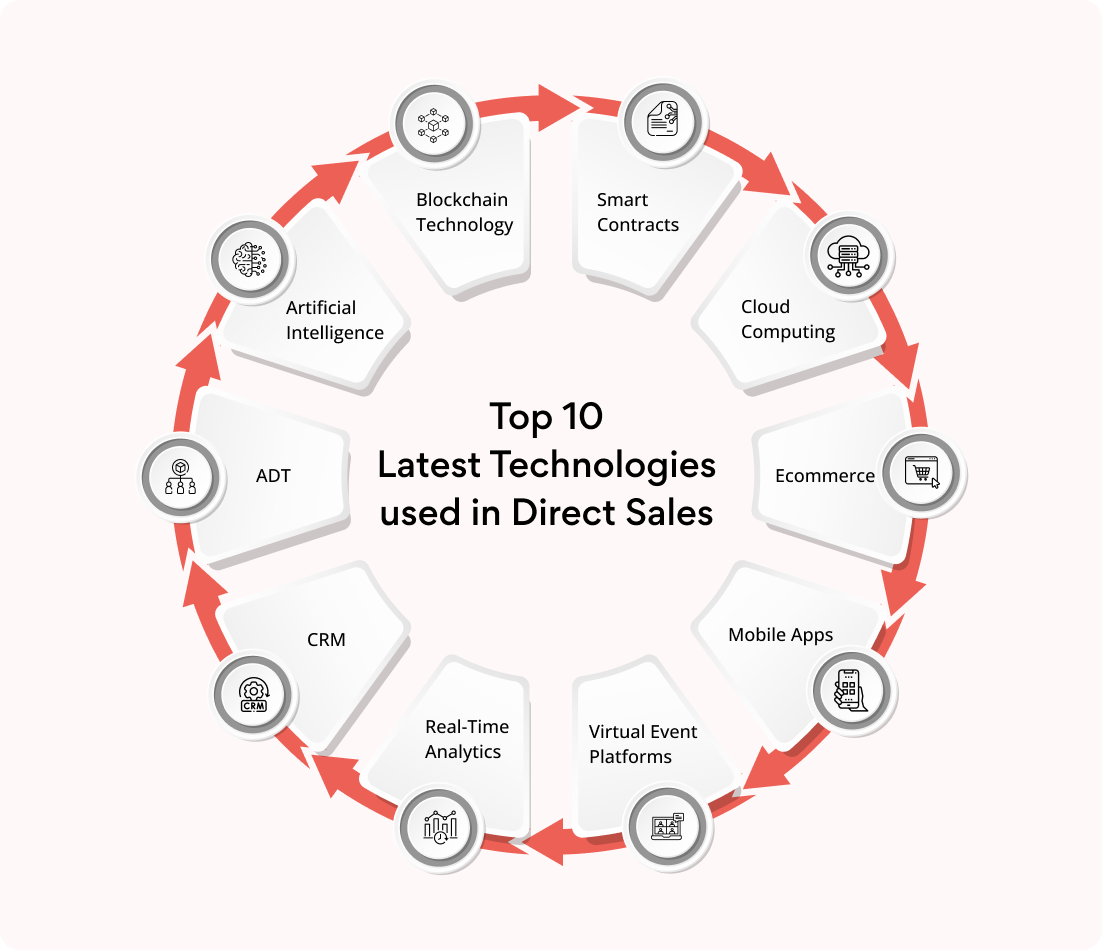
1. Artificial Intelligence (AI) is becoming more widespread
Artificial intelligence has to be part of any conversation about future technologies, and this has been true for some time now. In direct sales, AI comes in as a historical technological step by helping companies by:
Predicting future actions: Process big customer data sets to forecast future spending trends and conduct competitor analysis.
Personalized recommendations: Analyzes past customer interactions, purchase history, and browsing patterns to recommend products that align with their individual preferences. It enhances customer shopping experience by providing product suggestions that satisfy their interests.
Conducts sentiment analysis: Looks for attitudes, opinions, and emotions that are expressed in a social media mention, a review, or a content about the company's products and services. This provides valuable insights into customer satisfaction and areas needing improvement.
Organizing data and products: AI in MLM is quietly in for improving the management of data. It improves data capture, organization, and usage so that direct selling companies can maintain accurate and up-to-date records seamlessly. This improves data accessibility and enhances decision-making processes.
AI is employed in at least one business function reports 78% respondents which is an increase from 72% in 2024 and 55% in 2023.
Source: McKinsey
With cutting-edge technologies comes deep learning, machine learning, and natural language processing. Thus, AI has brought about incredible changes in the direct selling industry.
2. Blockchain technology enhances transparency
Blockchain technology uses a system that helps in storing public transactional records, called ‘blocks’ or ‘chains,’ across multiple databases linked by peer-to-peer nodes. This 'digital ledger' ensures transparency, accountability, and decentralization in direct selling transactions.
The period from 2025 to 2030 will witness a CAGR of 90.1% in the global blockchain technology market.
Source: Grand View Research
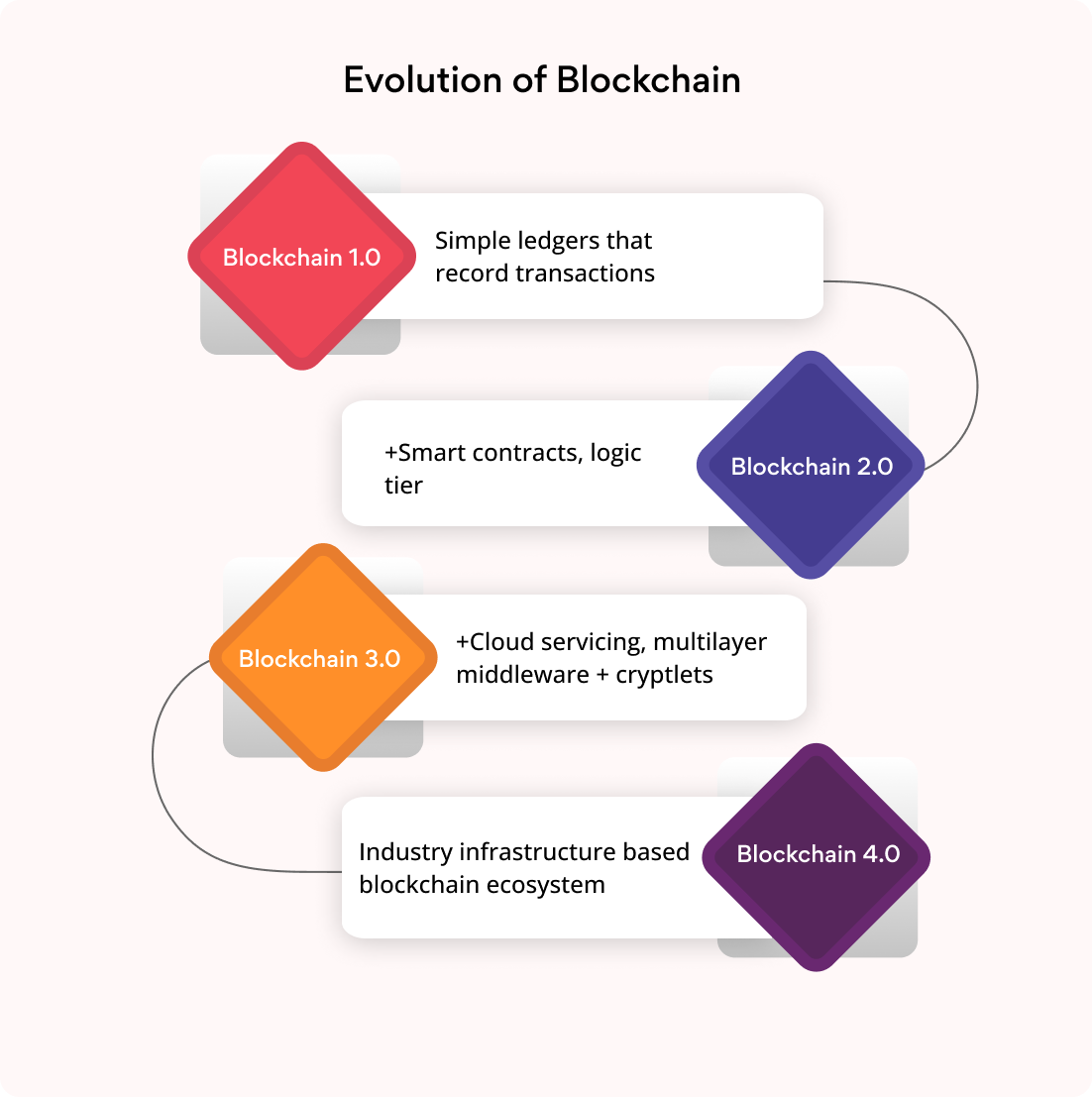
Why is blockchain important in direct sales?
Automation: Supports smart contracts, which can automate and simplify compensation plans. This allows network marketing companies to give individuals the opportunity to develop and earn using blockchain.
Transparency and trust: Creates a tamper-proof record of transactions, ensuring transparency for complex compensation plans in direct selling. A system where every sale, commission payout, and loyalty point are recorded on a digital ledger accessible to all distributors. This builds trust and eliminates disputes.
Streamline payouts: Streamline payouts by automating commission calculations and eliminating manual processing delays. This transparency provided by blockchain allows distributors to track their earnings in real-time, increasing trust and satisfaction.
Security: Uses cryptographic algorithms to secure transactions and data. Its decentralized structure makes it highly resistant to hacking and fraud. This secure system is essential in direct selling, safeguarding financial transactions and protecting distributor information.
This way of storing data makes it difficult or impossible for the system to be altered, hacked, or otherwise manipulated. It provides distributors and customers alike with increased trust in the accuracy of commissions, and other transactional records.
3. Smart contracts streamlines transactions
Building on blockchain, smart contracts take automation a step further. These self-executing contracts eliminate the need for manual intervention. For example, a smart contract could be programmed to automatically pay out a commission to a distributor once a sale is confirmed. This ensures timely and accurate payments, reducing friction and boosting distributor morale.
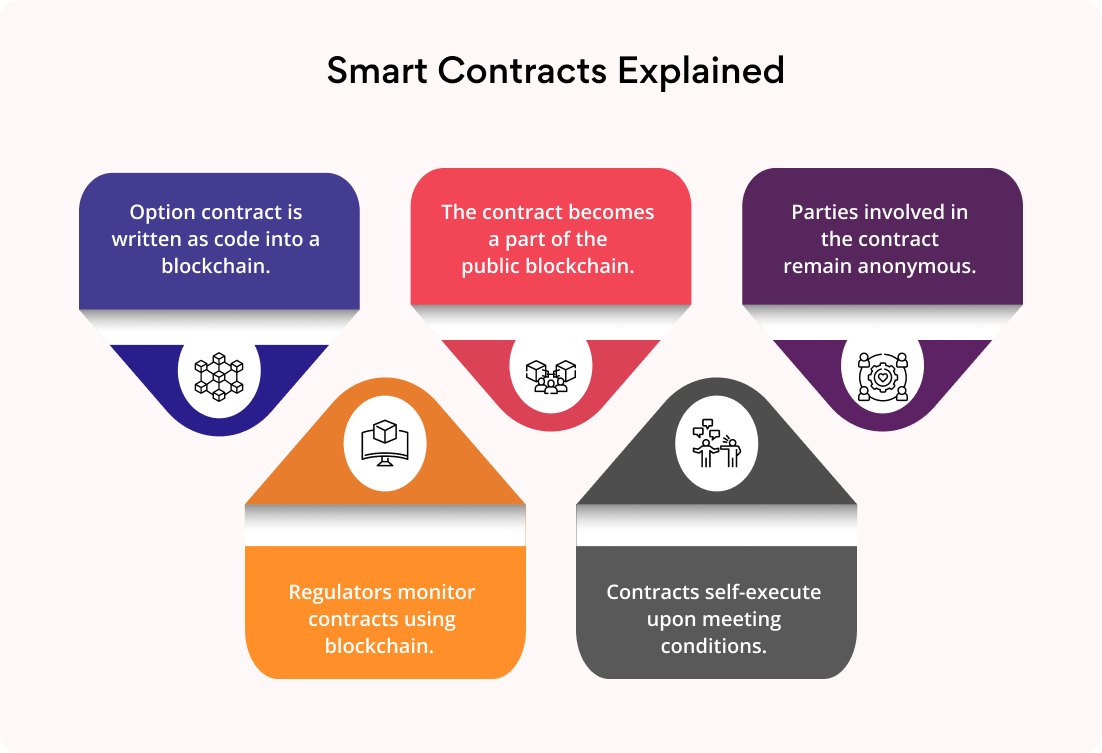
What are the advantages of smart contracts in direct sales?
Increased efficiency and automation: Automates many of the manual tasks involved in direct sales, such as commission payments, order fulfillment, and loyalty programs. This can free up salespeople to focus on closing deals and building relationships with customers.
Improved transparency and trust: Smart contracts are stored on a blockchain, which is a distributed ledger that provides a secure and transparent record of all transactions. This can help to build trust between direct sales companies and their customers.
Reduced errors and disputes: Smart contracts are self-executing. It means that they will only be carried out if certain conditions are met. This can help to reduce errors and disputes that can arise in traditional sales contracts.
Faster transactions: Because smart contracts are automated, they can help to speed up the sales process. This can be especially beneficial for direct selling companies that sell digital products or services.
4. Cloud computing enables scalable operations
Cloud computing has simplified file storage. That is, instead of saving files on a physical device or hard drive, users can store them online in the cloud. From here they can access the files needed from any location. This reduces costs and enhances workflow efficiency for direct selling networks.
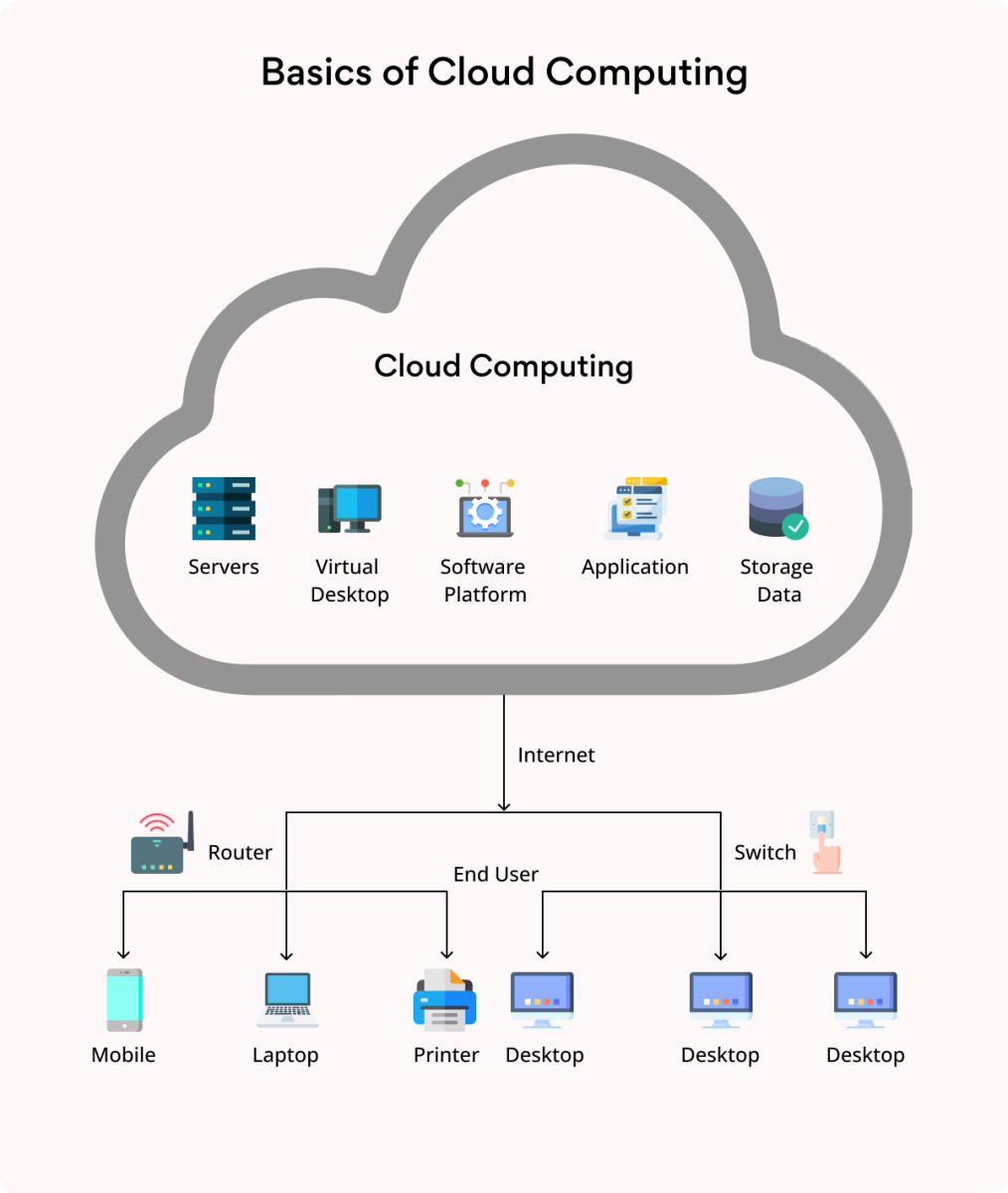
Evaluating the role of cloud computing in direct sales
Scalability: Direct selling companies can quickly adjust their operations as needed, without needing to invest in hardware upfront.
Real-time collaboration: Cloud platforms help team members and distributors work together instantly, boosting productivity and connection.
Data analytics: They can gather and study large amounts of sales and customer data to make smart decisions and plan strategies.
Accessibility: Sales representatives can use essential tools and data from anywhere with internet access, making remote work easier and more flexible.
5. Ecommerce and social media marketing expands reach
Ecommerce and social media have become central to the customer shopping experience in direct sales. Today, these companies are increasingly leveraging such platforms to reach broader audiences and provide personalized, engaging interactions.
In short,
Convenience of ecommerce platforms + interactive nature of social media = Enhanced customer experience
| Strategy | Ecommerce | Social Media |
|---|---|---|
| Expanded reach and accessibility | Reach customers globally | Connect with a wider and more diverse audience through campaigns |
| Personalized experiences | Offer tailored promotions and recommendations | Use data from social media data for personalized marketing strategies |
| Enhanced customer engagement | Interactive posts, videos, and live sessions | Real-time customer support and feedback |
| Increased sales opportunities | 24/7 shopping accessibility | Enable direct purchases through posts and ads |
| Efficient operations | Streamline order processing and inventory management | Use data analytics to optimize sales strategies |
| Building trust and loyalty | Provide clear and consistent communication | Foster community and loyalty through engaging content |
6. Mobile apps facilitate seamless customer engagement
Nowadays, businesses use mobile apps to introduce a fresh approach to how distributors communicate with customers and oversee their operations. Now with these direct sales app at their fingertips, distributors can access tools, resources, and instruction manuals at their own pace. This helps in automating admin duties and enhancing communication and collaboration.
For example,
Herbalife's 'HN MyClub' and 'Engage' apps empower distributors to seamlessly connect with customers, offering a mobile-centric experience.
Why do direct sales businesses need mobile applications?
Reach out to customers in a better way with direct and real-time communication between distributors and customers.
Automation of administrative tasks such as payments and commissions.
Enhanced customer experience by analyzing customer behavior and preferences to provide personalized product recommendations.
Provide push notifications to alert customers about new products, promotions, and updates.
More feature rich with a range of functionalities such as in-app purchases, loyalty programs, and customer feedback.
Competitive advantage by helping businesses to stay competitive by adopting modern sales and marketing techniques.
7. Virtual event platforms offer interactive experiences
Hosting virtual events is the latest trend and it's one way to add value to an event. Virtual event platforms allow distributors to join workshops, product releases, and other events remotely. It basically cuts down on travel and lodging expenses and saves valuable time.
It was $12.4 billion in 2022, but before this age hits 2027 the global virtual event platform market size is about to reach $30.6 billion. A growth at a CAGR of 19.8% during the forecast period.
Source: MarketsandMarkets
How can virtual event platforms enhance direct sales efforts?
Increased reach and accessibility: Distributors can join from anywhere. This increases event attendance and participation.
Cost efficiency: Reduces the need for travel and accommodation.
Enhanced engagement: Interactive tools like live chats, polls, Q&A sessions keep distributors engaged and active.
Seamless integration with ecommerce: Enables real-time product demonstrations and sales.
8. Real-time analytics provide data-driven insights
In direct sales, making decisions relies on analyzing data quickly. That is, quick data equals swift decisions. Real-time analytics comes to the forefront as the latest technology that lets distributors see, analyze, and use information as soon as it's available. The insights can be on sales trends, customer engagement, and team performance. Instead of raw data, it shows them processed information that empowers distributors to make decisions faster.
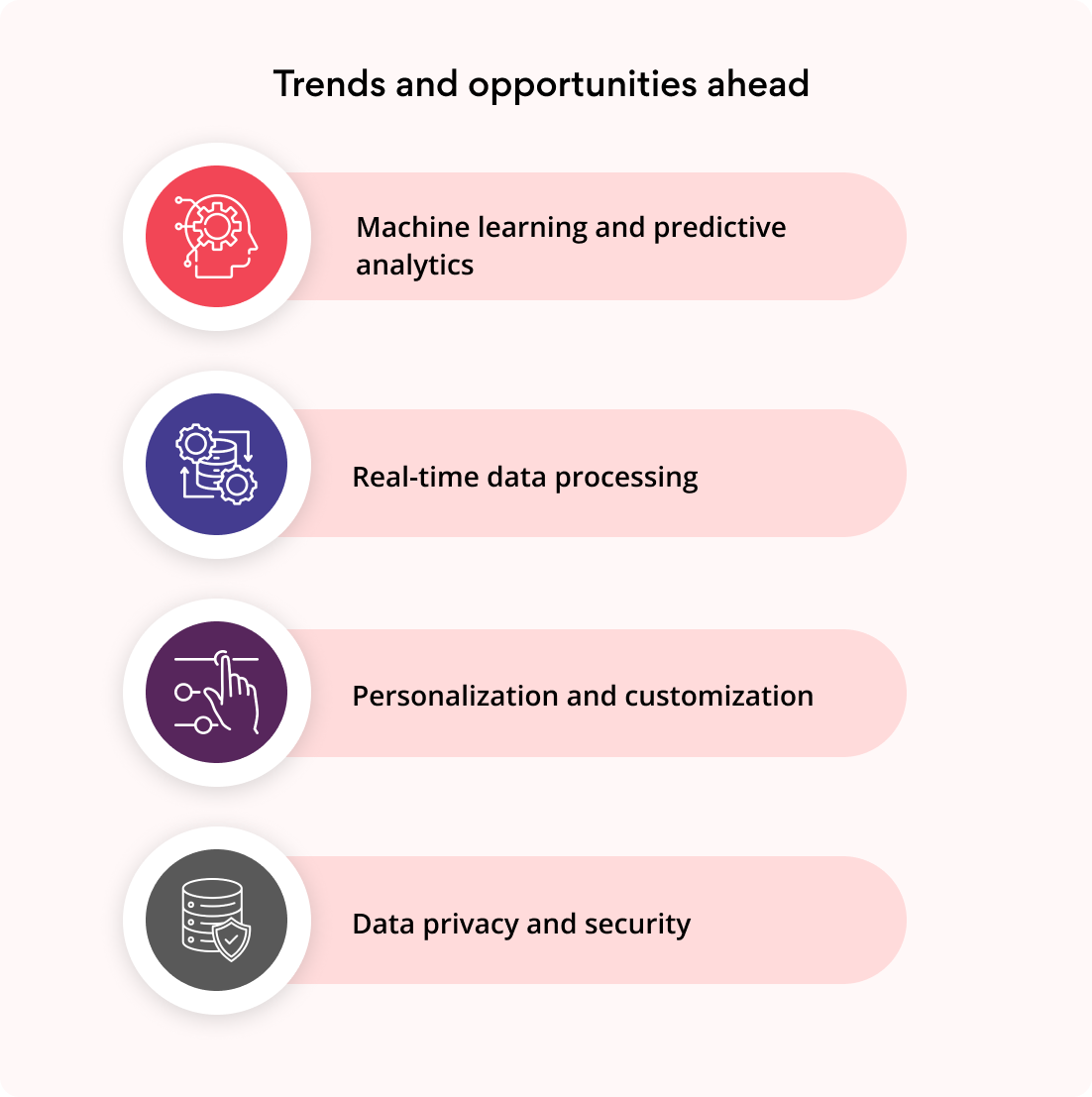
Here’s how real-time analytics is shaping this industry:
Enhanced distributor performance: Distributors can access personalized dashboards that display key performance indicators (KPIs) in real-time.
Personalized customer experiences: Analyze customer behavior patterns for hyper-personalized product recommendations and targeted promotions.
Optimized marketing campaigns: Monitor the effectiveness of marketing campaigns across various platforms to look out for any room for improvement.
Up-to-the-minute sales and inventory management levels: Forecast demand more accurately, preventing stockouts, and reducing excess inventory costs.
9. Customer Relationship Management (CRM) systems enhance experience
Customers are the part and parcel of direct selling businesses worldwide. So, fostering strong relationships with customers is paramount to success. That's where tailored CRM systems come in. They help distributors manage customer interactions and sales efficiently. By organizing data, automating tasks, and providing insights, these systems enable personalized service and effective communication. In essence, CRM systems enhance customer satisfaction and drive business growth in direct selling.
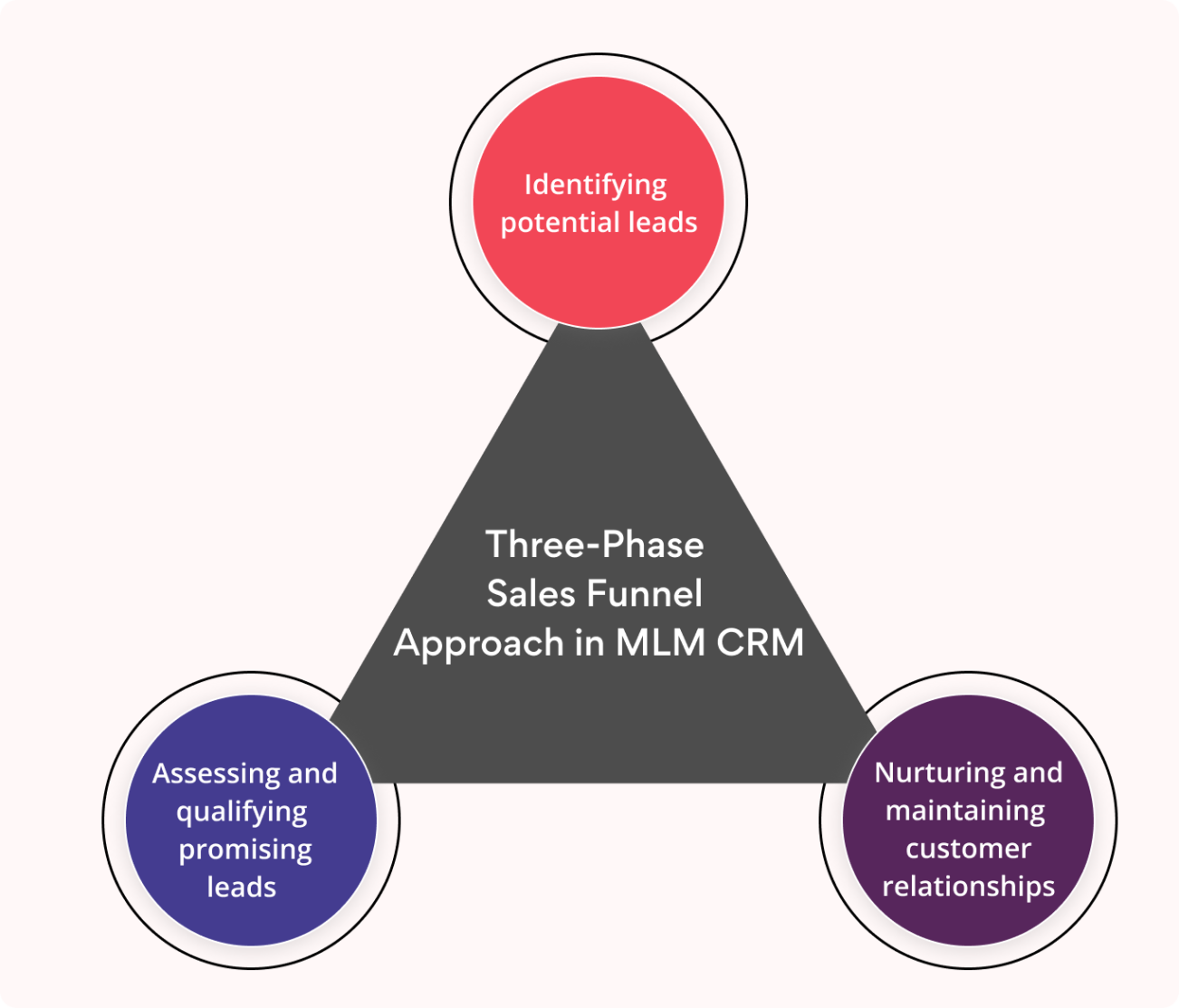
How CRM benefit direct sales businesses?
Network management: Efficiently organize and track distributor and customer networks. Helps to maintain clear records of each distributor's performance and their downline structure.
Communication and engagement: Automated communication tools in CRM system keep distributors and customers informed about products, promotions, and relevant updates.
Lead management: Track leads from start to finish to identify potential distributors and customers, nurture them, and convert them into active participants.
Customer retention and loyalty: Automate loyalty programs, track customer preferences, and offer personalized rewards and incentives.
Legal support and compliance: Assist in maintaining records and tracking legal requirements essential for direct selling businesses to stay compliant throughout.
10. Automated distributor training ensures efficient onboarding
Forward-thinking direct selling companies are using innovative solutions to boost their distributor networks. One exciting trend is automated distributor training. It begins by automating how new distributors are welcomed and introduced to the brand.
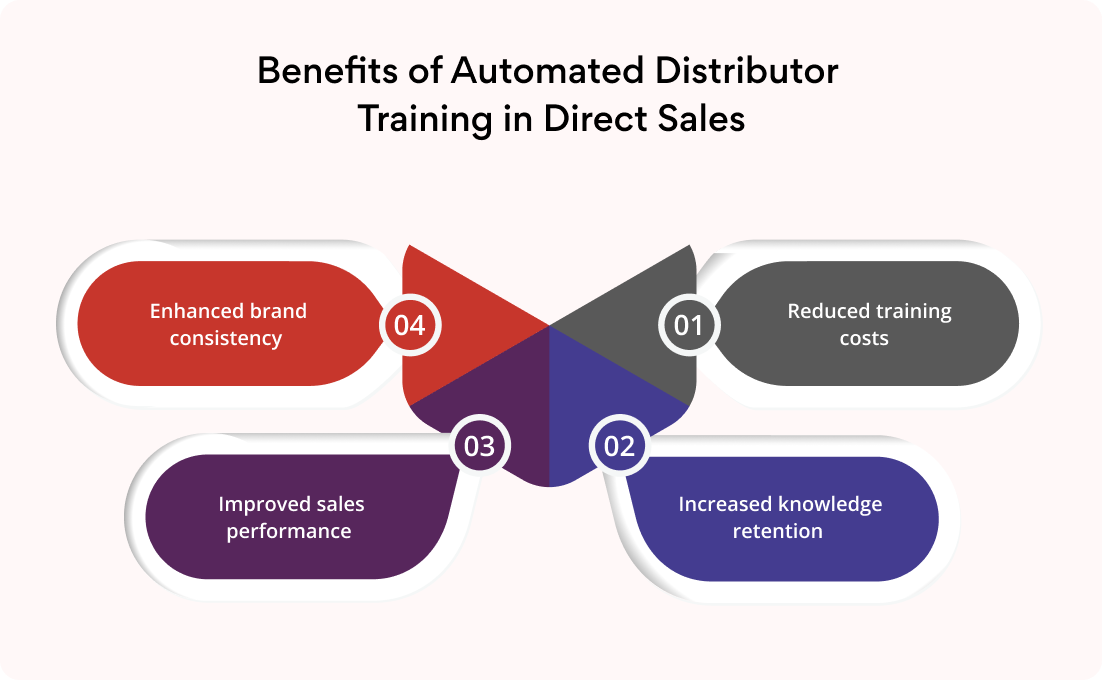
See how automated training platforms are enhancing distributor engagement and experience:
Personalized learning paths: Automated training platforms customize learning based on each distributor's experience, product knowledge, and sales goals, ensuring they focus on what's most relevant.
Data-driven training optimization: Real-time data from these platforms can identify areas where distributors struggle. This helps to refine training content and target areas needing improvement.
Microlearning and gamification: Bite-sized learning modules and gamified elements like badges, leaderboards, and rewards make training more motivating and engaging.
Continuous updates: Automated platforms can be easily updated with new product information, policy changes, and marketing materials.
Find out from our customers how our solutions give MLM businesses an edge and exceed customer expectations
Tech Trends Shaping Direct Selling: What to Expect in the Years Ahead
The direct selling industry is no stranger to reinvention. As technology advances, top companies in direct selling keep improving how they engage customers, streamline operations, and perform overall. Here's a look at some of the new technologies transforming direct selling:
Augmented Reality (AR) and Virtual Reality (VR)
In 2024, the AR & VR market is expected to make around $40.4 billion. By 2029, it's projected to grow at an annual rate of 8.97%, reaching about US$62.0 billion.
Source: Statista
It’s a magical world if a user can try on makeup virtually before making a purchase or take a 360-degree tour of a new skincare product right from their comfort zones. Comes in AR and VR to transform the ways products are demonstrated, offering customers a more interactive and immersive experience. This innovation:
Enhances the customer experience.
Reduces the reliance on physical samples.
Streamlines the sales process.
Internet of Things (IoT)
By 2027 there will likely be more than 29 billion IoT connections.
Source: IoT Analytics
With humongous amounts of data available on IoT devices in real-time, the connected world has become more exciting. In direct sales, the Internet of Things (IoT) is a rising trend that's all ready to reshape the industry. IoT devices and sensors are being added to direct selling products, and this allows for real-time data collection and remote monitoring. This data can be used to:
Provide personalized product recommendations.
Track usage patterns.
Identify maintenance or replacement needs.
The world will see a rise in the number of IoT devices to nearly 30% billion by 2030.
Source: Statista
Predictive analytics
In 2023, the predictive analytics market was worth about $14.71 billion. It's expected to grow to $18.02 billion in 2024 and reach $95.30 billion by 2032, with an annual growth rate of 23.1% during this forecast period.
Source: Fortune Business Insights
It’s all about analyzing historical data to predict future outcomes. With relevant variables handy, predictive analytics algorithms can make predictions with a certain level of confidence. In direct sales, advanced data analytics and machine learning algorithms are being used to study customer behavior, sales trends, and distributor performance. This helps direct selling companies to:
Make more informed decisions.
Optimize marketing strategies.
Provide personalized support to distributors.
Chatbots and conversational AI
In 2025, about 80% of conversational AI tools will likely include generative AI. It’s a jump from just 20% in 2023.
Source: Gartner
AI’s whisper can be heard all around in this tech-driven world. AI took a major leap with Chatbots and conversational AI and its ability to change the way individuals work by supporting human expertise and skills. This technology boosts customer satisfaction, enhances efficiency, and frees up human resources for more complex tasks. This technology is now being used to:
Reports from Grand View Research suggests that the global direct selling market is estimated to grow at a CAGR of 6.7% (2025-2030) generating an expected revenue of $328.26 billion by 2030.
Provide 24/7 customer support.
Answer product inquiries.
Assist distributors with administrative tasks.
Personalized digital experiences
Customers expect brands to understand their needs, with 73% preferring personalized experiences. As shoppers seek the best of online retail, brands must find new ways to personalize their digital experiences.
-Shopify
Personalization is a safe way to: provide a better customer experience, win more new customers, retain existing customers, and speed-up revenue. Direct selling companies are harnessing data and technology to create personalized digital experiences for both customers and distributors. This involves:
Customized product recommendations.
Targeted marketing campaigns.
Tailored training and support resources.
Integrated platforms
The Integration Platform as a Service market was valued at USD 3.7 billion in 2021. And this is expected to grow to $13.9 billion by 2026, with an annual growth rate of 30.3%.
It’s time to merge and progress! Direct selling companies are investing in integrated platforms that combine various technologies, such as ecommerce, CRM, and distributor management tools, into a single, seamless solution. This helps to:
Streamline operations.
Improve data integration.
Provide a more cohesive experience for both customers and distributors.
Tech evolution, business revolution
Experiences of direct selling companies with existing technology show us what's essential for sustainable business growth and which tech trends are going to lead the charge.
And as emerging technologies stand at the forefront of innovation, brands are investing big bucks in researching these new technologies because they have the potential to completely reshape industries.
But as technology keeps on progressing, it's really important for organizations to stay in the loop on the latest trends. This helps them better engage customers, streamline operations, and empower distributors with the tools they need to succeed.
The better that tech can do that, the more it’s going to be a true enabler of field. It’s going to drive sales. Conversations lead to relationships; relationships lead to sales. Unthinkable great things can happen, even late in the game.
- Advanced tech tools used
- Artificial Intelligence
- Blockchain Technology
- Smart Contracts
- Cloud Computing
- Ecommerce and Social Media Marketing
- Mobile Apps
- Virtual Event Platforms
- Real-Time Analytics
- Customer Relationship Management (CRM) Systems
- Automated Distributor Training
- Tech trends shaping direct selling
- AR and VR
- Internet of Things (IoT)
- Predictive Analytics
- Chatbots and Conversational AI
- Personalized Digital Experiences
- Integrated Platforms
- Finalizing tech









Leave your comment
Fill up and remark your valuable comment.